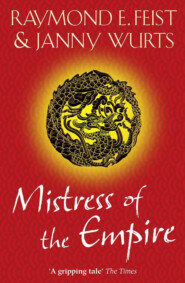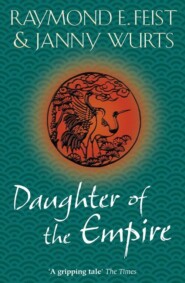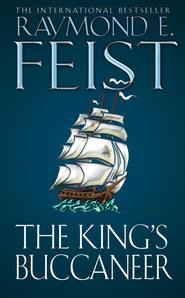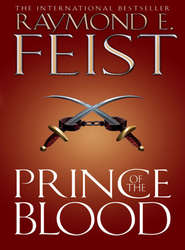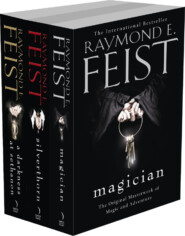По всем вопросам обращайтесь на: info@litportal.ru
(©) 2003-2024.
✖
The Complete Riftwar Saga Trilogy: Magician, Silverthorn, A Darkness at Sethanon
Автор
Год написания книги
2018
Настройки чтения
Размер шрифта
Высота строк
Поля
Longbow nodded, his eyes still fastened upon the spot where the stag had vanished into the woods. ‘That he is, Tomas.’
Pug said, ‘I thought you hunted stags, Martin. How—’
Martin said, ‘Old Whitebeard and I have something of an understanding, Pug. I hunt only bachelor stags, without does, or does too old to calve. When Whitebeard loses his harem to some younger buck someday, I may take him. Now each leaves the other to his own way. The day will come when I will look at him down the shaft of an arrow.’ He smiled at the boys. ‘I won’t know until then if I shall let the shaft fly. Perhaps I will, perhaps not.’ He fell silent for a time, as if the thought of Whitebeard’s becoming old was saddening, then as a light breeze rustled the branches said, ‘Now, what brings two such bold hunters into the Duke’s woods in the early morning? There must be a thousand things left undone with the Midsummer festival this afternoon.’
Tomas answered. ‘My mother tossed us out of the kitchen. We were more trouble than not. With the Choosing today . . .’ His voice died away, and he felt suddenly embarrassed. Much of Martin’s mysterious reputation stemmed from when he first came to Crydee. At his time for the Choosing, he had been placed directly with the old Huntmaster by the Duke, rather than standing before the assembled Craftmasters with the other boys his age. This violation of one of the oldest traditions known had offended many people in town, though none would dare openly express such feelings to Lord Borric. As was natural, Martin became the object of their ire, rather than the Duke. Over the years Martin had more than justified Lord Borric’s decision, but still most people were troubled by the Duke’s special treatment of him that one day. Even after twelve years some people still regarded Martin Longbow as being different and, as such, worthy of distrust.
Tomas said, ‘I’m sorry, Martin.’
Martin nodded in acknowledgment, but without humor. ‘I understand, Tomas. I may not have had to endure your uncertainty, but I have seen many others wait for the day of Choosing. And for four years I myself have stood with the other Masters, so I know a little of your worry.’
A thought struck Pug and he blurted, ‘But you’re not with the other Craftmasters.’
Martin shook his head, a rueful expression playing across his even features. ‘I had thought that, in light of your worry, you might fail to observe the obvious. But you’ve a sharp wit about you, Pug.’
Tomas didn’t understand what they were saying for a moment, then comprehension dawned. ‘Then you’ll select no apprentices!’
Martin raised a finger to his lips. ‘Not a word, lad. No, with young Garret chosen last year, I’ve a full company of trackers.’
Tomas was disappointed. He wished more than anything to take service with Swordmaster Fannon, but should he not be chosen as a soldier, then he would prefer the life of a forester, under Martin. Now his second choice was denied him. After a moment of dark brooding, he brightened: perhaps Martin didn’t choose him because Fannon already had.
Seeing his friend entering a cycle of elation and depression as he considered all the possibilities, Pug said, ‘You haven’t been in the keep for nearly a month, Martin.’ He put away the sling he still held and asked, ‘Where have you kept yourself?’
Martin looked at Pug as the boy instantly regretted his question. As friendly as Martin could be, he was still Huntmaster, a member of the Duke’s household, and keep boys did not make a habit of questioning the comings and goings of the Duke’s staff.
Martin relieved Pug’s embarrassment with a slight smile. ‘I’ve been to Elvandar. Queen Aglaranna has ended her twenty years of mourning the death of her husband, the Elf King. There was a great celebration.’
Pug was surprised by the answer. To him, as to most people in Crydee, the elves were little more than legend. But Martin had spent his youth near the elven forests and was one of the few humans to come and go through those forests to the north at will. It was another thing that set Martin Longbow apart from others. While Martin had shared elvish lore with the boys before, this was the first time in Pug’s memory he had spoken of his relationship to the elves. Pug stammered, ‘You feasted with the Elf Queen?’
Martin assumed a pose of modest inconsequence. ‘Well, I sat at the table farthest from the throne, but yes; I was there.’ Seeing the unasked questions in their eyes, he continued. ‘You know as a boy I was raised by the monks of Silban’s Abbey, near the elven forest. I played with elven children, and before I came here, I hunted with Prince Calin and his cousin, Galain.’
Tomas nearly jumped with excitement. Elves were a subject holding particular fascination for him. ‘Did you know King Aidan?’
Martin’s expression clouded, and his eyes narrowed, his manner suddenly becoming stiff. Tomas saw Martin’s reaction and said, ‘I’m sorry, Martin. Did I say something wrong?’
Martin waved away the apology. ‘No fault of yours, Tomas,’ he said, his manner softening somewhat. ‘The elves do not use the names of those who have gone to the Blessed Isles, especially those who have died untimely. They believe to do so recalls those spoken of from their journey there, denying them their final rest. I respect their beliefs.
‘Well, to answer you, no, I never met him. He was killed when I was only a small boy. But I have heard the stories of his deeds, and he was a good and wise King by all accounts.’ Martin looked about. ‘It approaches noon. We should return to the keep.’
He began to walk toward the path, and the boys fell in beside him.
‘What was the feast like, Martin?’ asked Tomas.
Pug sighed as the hunter began to speak of the marvels of Elvandar. He was also fascinated by tales of the elves, but to nowhere near the degree Tomas was. Tomas could endure hours of tales of the people of the elven forests, regardless of the speaker’s credibility. At least, Pug considered, in the Huntmaster they had a dependable eye witness. Martin’s voice droned on, and Pug’s attention wandered, as he again found himself pondering the Choosing. No matter that he told himself worry was useless: he worried. He found he was facing the approaching of this afternoon with something akin to dread.
The boys stood in the courtyard. It was Midsummer, the day that ended one year and marked the beginning of another. Today everyone in the castle would be counted one year older. For the milling boys this was significant, for today was the last day of their boyhood. Today was the Choosing.
Pug tugged at the collar of his new tunic. It wasn’t really new, being one of Tomas’s old ones, but it was the newest Pug had ever owned. Magya, Tomas’s mother, had taken it in for the smaller boy, to ensure he was presentable before the Duke and his court. Magya and her husband, Megar the cook, were as close to being parents to the orphan as anyone in the keep. They tended his ills, saw that he was fed, and boxed his ears when he deserved it. They also loved him as if he were Tomas’s brother.
Pug looked around. The other boys all wore their best, for this was one of the most important days of their young lives. Each would stand before the assembled Craftmasters and members of the Duke’s staff, and each would be considered for an apprentice’s post. It was a ritual, its origins lost in time, for the choices had already been made. The crafters and the Duke’s staff had spent many hours discussing each boy’s merits with one another and knew which boys they would call.
The practice of having the boys between eight and thirteen years of age work in the crafts and services had proved a wise course over the years in fitting the best suited to each craft. In addition, it provided a pool of semiskilled individuals for the other crafts should the need arise. The drawback to the system was that certain boys were not chosen for a craft or staff position. Occasionally there would be too many boys for a single position, or no lad judged fit even though there was an opening. Even when the number of boys and openings seemed well matched, as it did this year, there were no guarantees. For those who stood in doubt, it was an anxious time.
Pug scuffed his bare feet absently in the dust. Unlike Tomas, who seemed to do well at anything he tried, Pug was often guilty of trying too hard and bungling his tasks. He looked around and noticed that a few of the other boys also showed signs of tension. Some were joking roughly, pretending no concern over whether they were chosen or not. Others stood like Pug, lost in their thoughts, trying not to dwell on what they would do should they not be chosen.
If he was not chosen, Pug – like the others – would be free to leave Crydee to try to find a craft in another town or city. If he stayed, he would have to either farm the Duke’s land as a franklin, or work one of the town’s fishing boats. Both prospects were equally unattractive, but he couldn’t imagine leaving Crydee.
Pug remembered what Megar had told him, the night before. The old cook had cautioned him about fretting too much over the Choosing. After all, he had pointed out, there were many apprentices who never advanced to the rank of journeyman, and when all things were taken into account, there were more men without craft in Crydee than with. Megar had glossed over the fact that many fishers’ and farmers’ sons forsook the choosing, electing to follow their fathers. Pug wondered if Megar was so removed from his own Choosing he couldn’t remember that the boys who were not chosen would stand before the assembled company of Craftmasters, householders, and newly chosen apprentices, under their gaze until the last name was called and they were dismissed in shame.
Biting his lower lip, Pug tried to hide his nervousness. He was not the sort to jump from the heights of Sailor’s Grief should he not be chosen, as some had done in the past, but he couldn’t bear the idea of facing those who had been chosen.
Tomas, who stood next to his shorter friend, threw Pug a smile. He knew Pug was fretting, but could not feel entirely sympathetic as his own excitement mounted. His father had admitted that he would be the first called by Swordmaster Fannon. Moreover, the Swordmaster had confided that should Tomas do well in training, he might be found a place in the Duke’s personal guard. It would be a signal honor and would improve Tomas’s chance for advancement, even earning him an officer’s rank after fifteen or twenty years in the guard.
He poked Pug in the ribs with an elbow, for the Duke’s herald had come out upon the balcony overlooking the courtyard. The herald signaled to a guard, who opened the small door in the great gate, and the Craftmasters entered. They crossed to stand at the foot of the broad stairs of the keep. As was traditional, they stood with their backs to the boys, waiting upon the Duke.
The large oaken doors of the keep began to swing out ponderously, and several guards in the Duke’s brown and gold darted through to take up their positions on the steps. Upon each tabard was emblazoned the golden gull of Crydee, and above that a small golden crown, marking the Duke a member of the royal family.
The herald shouted, ‘Hearken to me! His Grace, Borric conDoin, third Duke of Crydee, Prince of the Kingdom; Lord of Crydee, Carse, and Tulan; Warden of the West; Knight-General of the King’s Armies; heir presumptive to the throne of Rillanon.’ The Duke stood patiently while the list of offices was completed, then stepped forward into the sunlight.
Past fifty, the Duke of Crydee still moved with the fluid grace and powerful step of a born warrior. Except for the grey at the temples of his dark brown hair, he looked younger than his age by twenty years. He was dressed from neck to boot in black, as he had been for the last seven years, for he still mourned the loss of his beloved wife, Catherine. At his side hung a black-scabbarded sword with a silver hilt, and upon his hand his ducal signet ring, the only ornamentation he permitted himself.
The herald raised his voice. ‘Their Royal Highnesses, the Princes Lyam conDoin and Arutha conDoin, heirs to the House of Crydee; Knight-Captains of the King’s Army of the West; Princes of the royal house of Rillanon.’
Both sons stepped forward to stand behind their father. The two young men were six and four years older than the apprentices, the Duke having wed late, but the difference between the awkward candidates for apprenticeship and the sons of the Duke was much more than a few years in age. Both Princes appeared calm and self-possessed.
Lyam, the older, stood on his father’s right, a blond, powerfully built man. His open smile was the image of his mother’s, and he looked always on the verge of laughter. He was dressed in a bright blue tunic and yellow leggings and wore a closely trimmed beard, as blond as his shoulder-length hair.
Arutha was to shadows and night as Lyam was to light and day. He stood nearly as tall as his brother and father, but while they were powerfully built, he was rangy to the point of gauntness. He wore a brown tunic and russet leggings. His hair was dark and his face clean-shaven. Everything about Arutha gave one the feeling of quickness. His strength was in his speed: speed with the rapier, speed with wit. His humor was dry and often sharp. While Lyam was openly loved by the Duke’s subjects, Arutha was respected and admired for his ability, but not regarded with warmth by the people.
Together the two sons seemed to capture most of the complex nature of their sire, for the Duke was capable of both Lyam’s robust humor and Arutha’s dark moods. They were nearly opposites in temperament, but both capable men who would benefit the Duchy and Kingdom in years to come. The Duke loved both his sons.
The herald again spoke. ‘The Princess Carline, daughter of the royal house.’
The slim and graceful girl who made her entrance was the same age as the boys who stood below, but already beginning to show the poise and grace of one born to rule and the beauty of her late mother. Her soft yellow gown contrasted strikingly with her nearly black hair. Her eyes were Lyam’s blue, as their mother’s had been, and Lyam beamed when his sister took their father’s arm. Even Arutha ventured one of his rare half smiles, for his sister was dear to him also.
Many boys in the keep harbored a secret love for the Princess, a fact she often turned to her advantage when there was mischief afoot. But even her presence could not drive the day’s business from their minds.
The Duke’s court then entered. Pug and Tomas could see that all the members of the Duke’s staff were present, including Kulgan. Pug had glimpsed him in the castle from time to time since the night of the storm, and they had exchanged words once, Kulgan inquiring as to his well-being, but mostly the magician was absent from sight. Pug was a little surprised to see the magician, for he was not properly considered a full member of the Duke’s household, but rather a sometime adviser. Most of the time Kulgan was ensconced in his tower, hidden from view as he did whatever magicians do in such places.
The magician was deep in conversation with Father Tully, a priest of Astalon the Builder and one of the Duke’s oldest aides. Tully had been adviser to the Duke’s father and had seemed old then. He now appeared ancient – at least to Pug’s youthful perspective – but his eyes betrayed no sign of senility. Many a keep boy had been impaled upon the pointed gaze of those clear grey eyes. His wit and tongue were equally youthful, and more than once a keep boy had wished for a session with Horsemaster Algon’s leather strap rather than a tongue-lashing from Father Tully. The white-haired priest could nearly strip the skin from a miscreant’s back with his caustic words.
Nearby stood one who had experienced Tully’s wrath upon occasion, Squire Roland, son of Baron Tolburt of Tulan, one of the Duke’s vassals. He was companion to both Princes, being the only other boy of noble birth in the keep. His father had sent him to Crydee the year before, to learn something of the management of the Duchy and the ways of the Duke’s court. In the rather rough frontier court Roland discovered a home away from home. He was already something of a rogue when he arrived, but his infectious sense of humor and ready wit often eased much of the anger that resulted from his prankish ways. It was Roland, more often than not, who was Princess Carline’s accomplice in whatever mischief she was embarked upon. With light brown hair and blue eyes, Roland stood tall for his age. He was a year older than the gathered boys and had played often with them over the last year, as Lyam and Arutha were frequently busy with court duties. Tomas and he had been boyish rivals at first, then fast friends, with Pug becoming his friend by default, because where Tomas was, Pug was certain to be nearby. Roland saw Pug fidgeting near the edge of the assembled boys and gave him a slight nod and wink. Pug grinned briefly, for while he was as often the butt of Roland’s jokes as any other, he still found himself liking the wild young Squire.
After all his court was in attendance, the Duke spoke. ‘Yesterday was the last day of the eleventh year of the reign of our Lord King, Rodric the Fourth. Today is the Festival of Banapis. The following day will find these boys gathered here counted among the men of Crydee, boys no longer, but apprentices and freemen. At this time it is proper for me to inquire if any among you wishes to be released from service to the Duchy. Are there any among you who so wish?’ The question was formal in nature and no response was expected, for few ever wished to leave Crydee. But one boy did step forward.
The herald asked, ‘Who seeks release of his service?’
The boy looked down, clearly nervous. Clearing his throat, he said, ‘I am Robert, son of Hugen.’ Pug knew him, but not well. He was a netmender’s son, a town boy, and they rarely mixed with the keep boys. Pug had played with him upon a few occasions and had a sense the lad was well regarded. It was a rare thing to refuse service, and Pug was as curious as any to hear the reasons.






